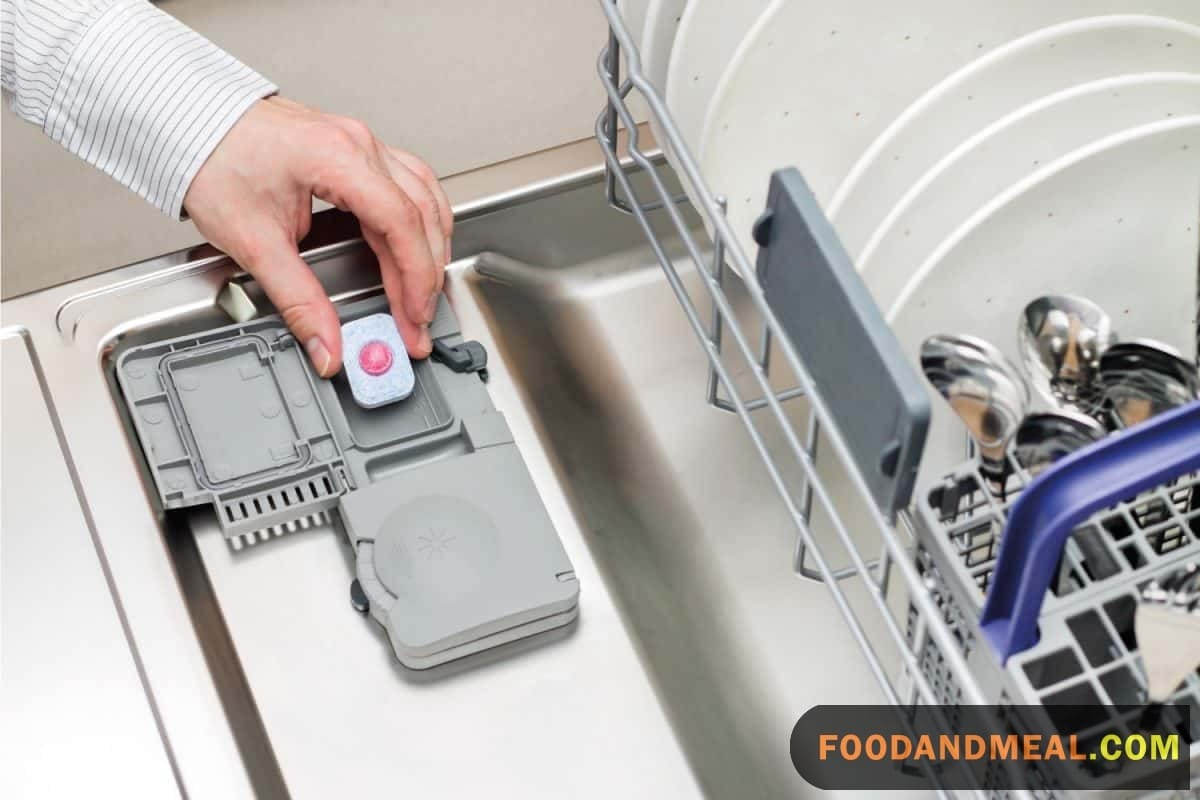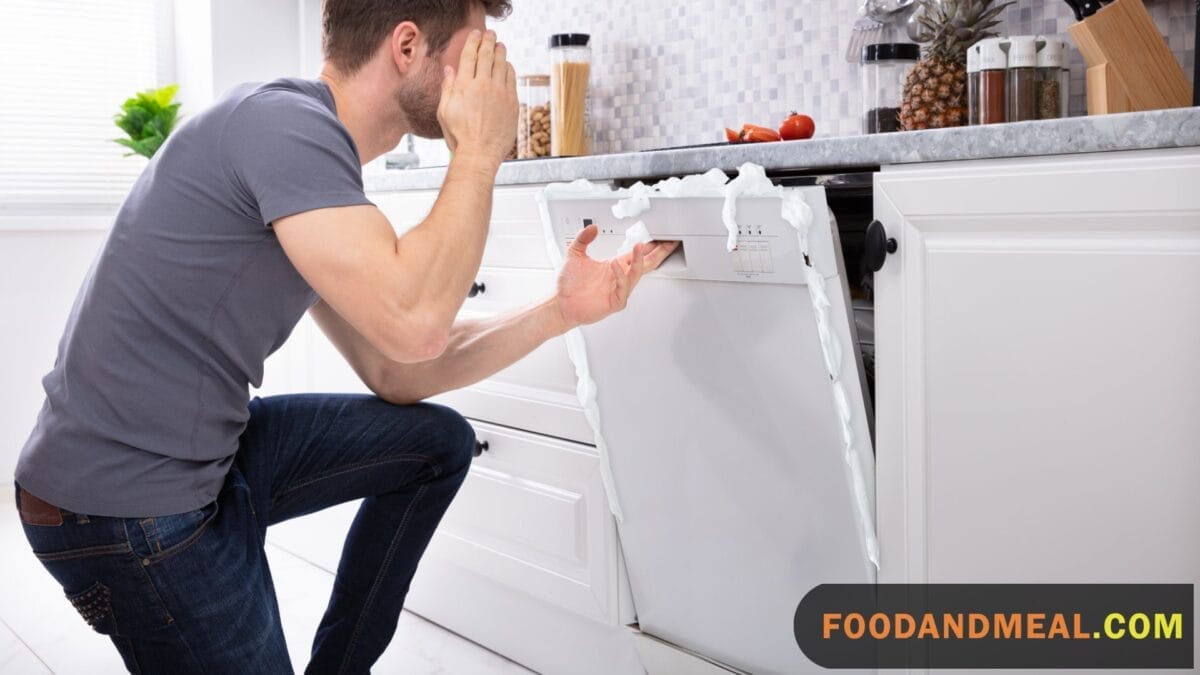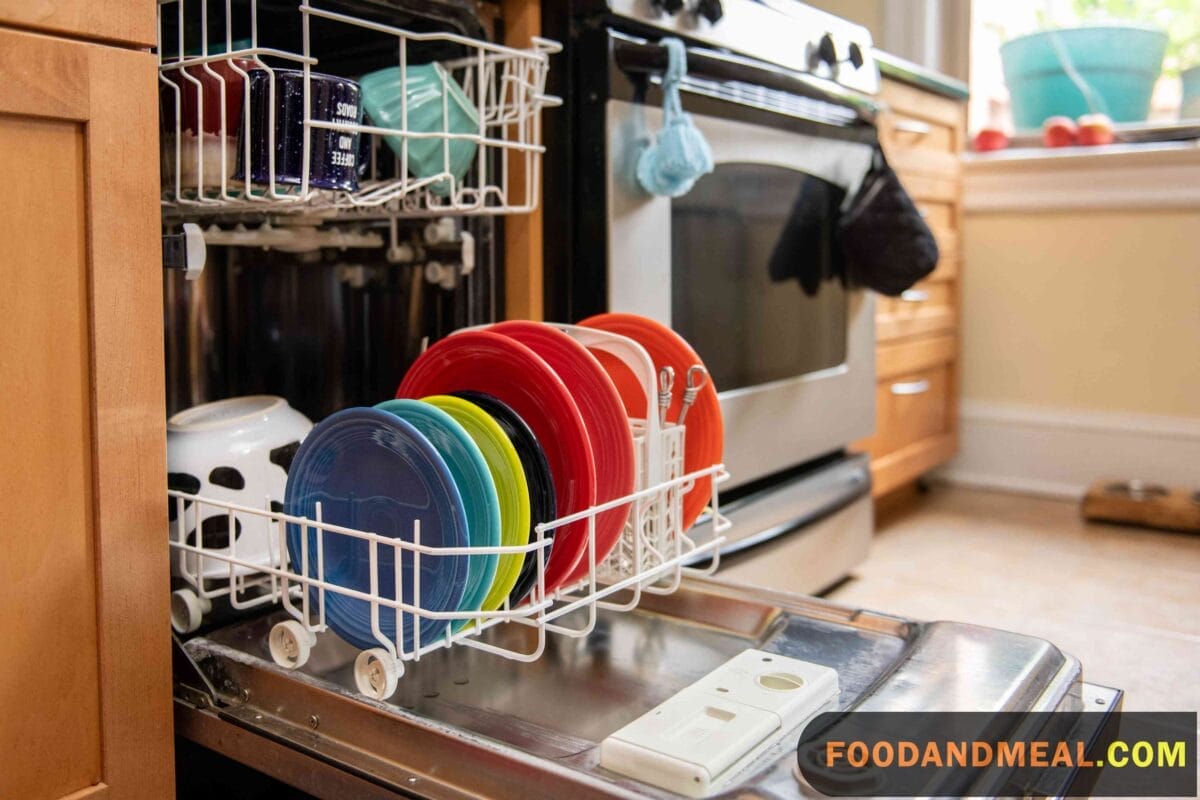Can You Use Dish Soap in the Dishwasher ? Exclusively employ dishwasher detergent in your dishwasher, as it is specifically formulated for this appliance, ensuring effective dish cleaning without generating suds. If you ever find yourself without dishwasher detergent and contemplate using regular dish soap, continue reading to understand why we recommend adhering to dishwasher detergent for optimal appliance performance.
What happens if you put dish soap in the dishwasher?
If you introduce dish soap into the dishwasher, it is likely to generate a dense foam of suds within the machine, potentially leading to overflow through the dishwasher door. Dish soap depends, in part, on the formation of suds and bubbles to effectively clean your dishes.
In contrast, dishwasher detergent primarily relies on enzymes for dish cleaning, minimizing the emphasis on suds. When you place dishwasher detergent or a dishwasher pod into the dispenser, it dissolves in the water. As the water circulates within the dishwasher, the detergent’s enzymes actively engage in breaking down residues and messes. These enzymes facilitate the decomposition of proteins and starches into smaller particles, which are then effectively flushed away with the water.

What to do if you accidentally put dish soap in your dishwasher
In the event that dish soap is mistakenly introduced into the dishwasher, it is crucial to immediately interrupt the dishwasher’s operation. Taking swift action, ensure a comprehensive cleaning and thorough rinsing process to eliminate any lingering dish soap residues within the machine. As an additional measure, it is advisable to undertake the cleaning of your dishwasher filter to guarantee optimal performance in subsequent cycles.
To rectify this situation and expedite the return to seamless dish-cleaning functionality, consider following the detailed steps outlined below. These instructions are designed to guide you through the process of eradicating dish soap from the dishwasher effectively, ensuring a swift resolution and the restoration of your dishwasher’s normal operation in no time.
Step 1: Immediately halt the dishwasher operation
In the unfortunate event of accidentally introducing dish soap into your dishwasher, the first critical step is to act swiftly and bring the dishwasher to an immediate halt. This proactive measure aims to minimize the ensuing mess, preventing it from exacerbating further. Employ dry towels to address any soap spillage on the floor or other surfaces. Allow the dishwasher to fully drain before proceeding to the subsequent steps.
Step 2: Carefully remove dishes and initiate rinsing
Prepare for the dishwasher cleaning process by delicately removing all dishes and rinsing them in the sink. This preliminary action ensures that once the dishwasher is cleansed, your dishes can seamlessly be returned to their designated spaces, ready for the subsequent dishwasher cycle.

Step 3: Introduce vegetable oil or vinegar for remediation
Upon complete drainage of the dishwasher, introduce a quarter cup of vegetable or another type of cooking oil into the dishwasher’s bottom. Initiate a Quick Cycle without adding any detergent or dishes. The additional oil serves a dual purpose—suppressing the suds and facilitating the expulsion of soap remnants from the dishwasher. If suds persist, consider repeating this step.
Alternatively, opt for a quarter cup of vinegar in lieu of vegetable oil. Pour the vinegar into the dishwasher’s bottom to quell the suds, followed by a water rinse to thoroughly eliminate any remaining soap suds. Conclude this step by draining the dishwasher.
Step 4: Thorough rinse cycle to ensure residue removal
With the successful elimination of suds, consider running an additional rinse cycle. This step is crucial in ensuring the complete removal of any lingering soap residue within the dishwasher, guaranteeing a pristine interior for future use.
Step 5: Detailed dishwasher cleaning
Once confident that all traces of dish soap have been eradicated from the dishwasher, proceed with a comprehensive cleaning regimen for the dishwasher itself. Employ a specialized dishwasher cleaner, such as affresh, to meticulously cleanse the interior. This final step ensures that your dishwasher is not only free from soap remnants but is also optimally prepared and primed for its next cycle, maintaining peak performance and hygiene.
Can you make own dishwasher detergent?
When it comes to dishwashing, Food and Meal recommend the use of automatic dishwasher detergent that has been meticulously crafted for dishwasher use. Our collective experiences with various products have shown that top-tier tablets and packs outperform powder, liquid, or gel detergents, particularly in reducing filming on dishes. Crafting our own dishwasher detergent is not advisable, as it holds the potential to damage the appliance or lead to untidy outcomes.

Is It Okay to Use Dish Soap in Dishwashers with Hard Water?
When dealing with hard water in dishwashers, using dish soap can be a viable option. However, it is essential to choose the right dishwasher designed to tackle hard water problems effectively. To make the most of your cleaning routine, consider investing in top picks for hard water dishwashers, specifically designed to combat the challenges associated with mineral-rich water.
Safe Alternatives to Dishwashing Detergent
When facing the unexpected scenario of running out of conventional dishwasher detergent, it’s important to exercise caution when considering alternatives. While substituting even a small amount of regular dishwashing soap for dedicated dishwasher detergent can result in a recipe for disaster, a unique solution emerges by combining a minimal quantity of ordinary dishwashing soap with the cleaning power of baking soda.
For those moments when you find yourself in need of an “emergency” dishwasher detergent, here’s a simple and effective recipe:
- Begin by filling your dishwasher’s soap container to approximately 3/4 full with baking soda. This kitchen staple is renowned for its abrasive yet non-abrasive cleaning properties.
- Introduce just a few drops of your preferred dishwashing soap into the mix. Common brands like Dawn or Lux work well for this purpose.
- If your area has hard water, enhance the effectiveness of the homemade detergent by adding 1/4 cup of salt. This addition aids in addressing the challenges posed by mineral-rich water.
- With the ingredients combined, proceed to run your dishwasher as you typically would, ensuring the mixture is distributed evenly during the washing cycle.
This improvised dishwasher detergent not only offers a practical solution in times of necessity but also proves effective in yielding sparkling clean dishes. The baking soda, with its gentle abrasiveness, works to remove stains and residue, while the dishwashing soap contributes to a thorough cleansing process. The inclusion of salt helps mitigate the impact of hard water, ensuring a more satisfactory outcome. While this homemade alternative serves as a convenient backup, it’s important to note that regular use of dedicated dishwasher detergent is recommended for optimal appliance performance and longevity.
FAQs
Q: What happens if you put dish soap in the dishwasher?
A: If you put dish soap in the dishwasher, it will likely create a thick foam of suds inside the dishwasher that may eventually spill out through the dishwasher door. Dish soap relies in part on suds and bubbles to get your dishes clean. Dishwasher detergent relies mostly on enzymes to clean your dishes, rather than suds.
Q: What should you do if you accidentally put dish soap in your dishwasher?
A: If you accidentally put dish soap in your dishwasher, stop the dishwasher right away. Then, drain the dishwasher, remove the dishes, add 1⁄4 cup vegetable oil or vinegar to the bottom of the dishwasher to suppress suds, and run a rinse or quick wash cycle. You may need to repeat this a few times. Finally, run the dishwasher empty to clean out any remaining residue.
Q: What is the difference between dish soap and dishwasher detergent?
A: Dish soap relies on suds and bubbles to clean dishes. Dishwasher detergent relies on enzymes that break down and dissolve food residues and grease so they can be flushed away by the water. Detergent is formulated specifically for use in dishwashers.
Q: Can you use liquid hand soap in a dishwasher?
A: No, you should not use liquid hand soap or bar soap in the dishwasher. Only detergents made specifically for dishwashers should be used. Hand and bar soaps will create excessive suds that can overflow.
Q: What happens if you regularly use dish soap in the dishwasher?
A: Using dish soap regularly in the dishwasher can lead to a buildup of soap scum over time. This scum can leave cloudy residue on dishes, as well as clog the dishwasher filter, spray arms, and other components. It’s best to only use detergent made for dishwashers.
I'm Kelly Atkinson, with a passion for dissecting the world of home goods. My reviews stem from thorough testing and a love for sharing detailed insights. Each piece I write offers a glimpse into my explorative journey, aiming to guide readers to informed choices with authenticity and precision, making every review a blend of exploration and expertise.
